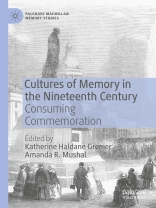This collection provides a long-overdue examination of the nineteenth century as a crucible of new commemorative practices. Distinctive memory cultures emerged during this period which would fundamentally reshape public and private practices of remembrance in the modern world. The essays in this volume bring together scholars of History, Literature, Art History, and Musicology to explore uses of memory in nineteenth-century empire-building and constructions of national identity, cultures of sentiment and mourning practices, and discourses of race and power. Contributors approach the topic through case studies of Europe, the United States, and the British Empire. Their analyses of nineteenth-century innovations in commemoration at both the personal and the larger civic and political levels will appeal to students and scholars of memory and of the nineteenth-century world.
Cuprins
1. Introduction.- Part I Memory and the Personal: Community, Commercial Culture, and Global Commerce.- 2. Mirrors with a Memory: Postmortem Photography and Spirit Photography in Transitional British Fiction and Culture.- 3. Autograph Albums and the Commercialization of Memory in the United States.- 4. Music for Birthdays: Commemorative Birthday Pieces in Johannes Brahms’s Circle (1853–1854) and Elsewhere.- 5. A Whale Is a Palimpsest: Dismembering and Remembering in Moby-Dick and Fighting the Whales.- 6. VVotive Boats, Ex-votos, and Maritime Memory in Atlantic France.- Part II Memory and Civic Identity.- 7.Libby Prison War Museum: Site of Commemoration or Commercial Enterprise.- 8. Randolph Cemetery and the Politics of Death in the Post-Civil War South.- 9. “The Same Effort and the Same Death”: The Memory of the Langalibalele Incident of 1873.- 10. Remembering the 1857 Indian Uprisingin Civic Celebrations.- 11.Nationalist Ironies: The Legacy of the Federalist Party and the Construction of a Unified Republic.- 12. German Domestic Pedestrian Tourism and the Rhetoric of National Historical Memory, Empire, and Middle-Class Identity 1780s–1850s.- 13. The Art of Memory: Tracing the Colonial in Contemporary India.
Despre autor
Katherine Haldane Grenier is Professor of History at The Citadel, USA. She is the author of Tourism and Identity in Scotland: Creating Caledonia, 1770-1914 (2005).
Amanda R. Mushal is Associate Professor of History at The Citadel, USA. She is a contributor to The Field of Honor: Essays on Southern Character and American Identity (2017) and The Southern Middle Class in the Long Nineteenth Century (2011).












